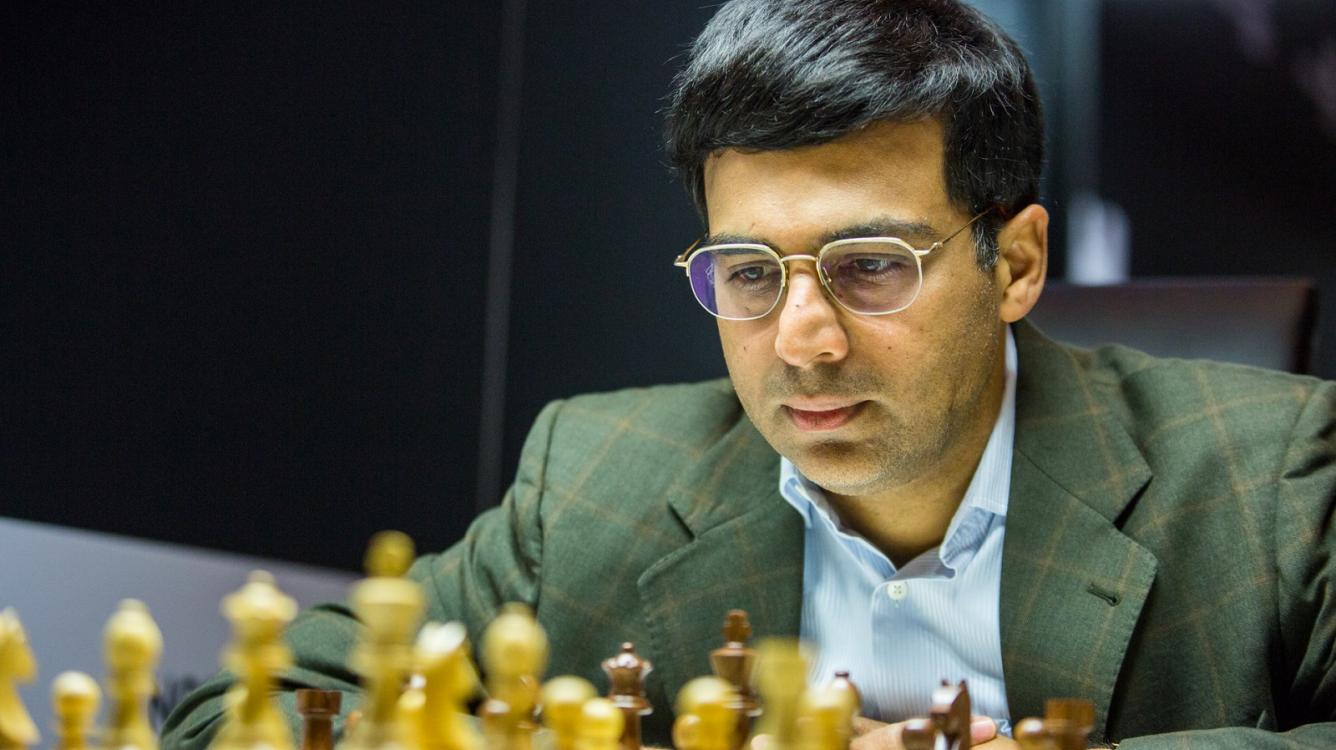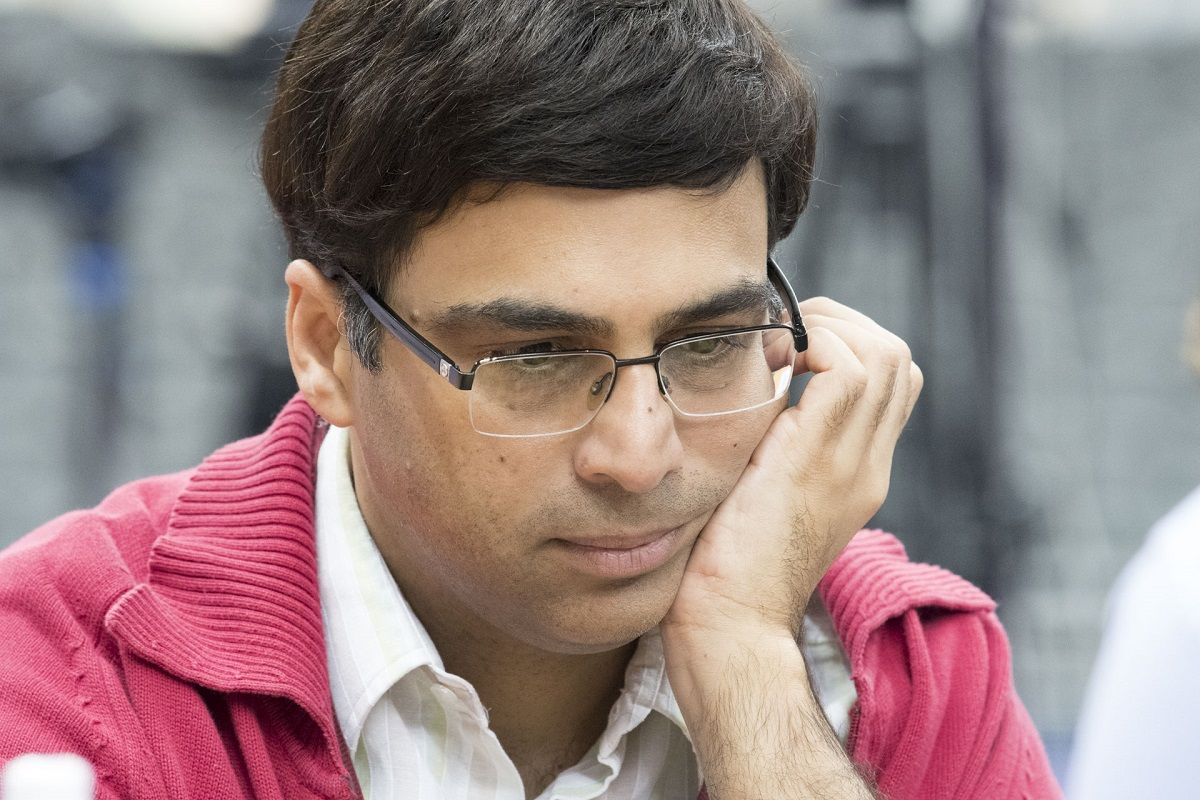
Interview With Anand: 'The Brain Switches Off If It Gets Too Bored'
Many years ago I was lucky to work at the press room of the Super Tournament of Linares, helping my good friend IM Bjarke Sahl make the bulletin of that fantastic event of the 64 squares that many people ended up calling "the Wimbledon of chess". I met in person most of the participants in that edition, and Vishy Anand caused a big impression for his humility and his kindness. After the tournament he visited my city, Granada, which is one hour and a half away from Linares, and I showed him the most symbolic places of one of the most beautiful cities in the world. I even had the chance to play 20 or 30 blitz games against him. I don't quite remember whether the outcome of the "match" was 20-0 or maybe 30-0.
25 years after that encounter, I found out that he's still the great person that I once met.
Luison: Years ago, when we first met, you were famous for how quickly you played your games, that impressed me a lot in that Linares tournament I visited in 1992 or 1993...
Anand: 1991, actually.
Ah! 1991, then. I trust your memory much more than mine. But it was really impressive how fast you played...
Yes, when I was young I got used to playing that way and I always did, that was my pace. Then I understood that that could cost me many points, if in some specific important moments I didn't stop and think deeply... Now I'm more balanced, I don't play as fast... But I don't get in time trouble in all games either.
I remember once someone walked into the chess club saying that you'd lost a game on time to Kamsky...
Yes, in 1995...
Everyone thought it was a joke. Was that when you started changing and thinking longer?
No, no. It didn't happen at a specific moment. In that same tournament of Linares 91, in the third round I lost an absolutely won game, a computer today would tell you I had an advantage of +3 or +4... and I lost because I didn't stop to think.
Who was your opponent?
Beljavsky. With experience, you gradually change... But my evolution didn't happen at a specific moment.
How has your view on chess and on the professional chess player changed over the years?
You ask me difficult questions... as you accumulate experiences, in a career that lasts for decades, you will see many games that you don't understand, but when you try to understand, you gradually learn new things, you play against more opponents and each of them has an influence on you. It's a number of very big processes that happen during your whole life, without making a special effort. Even if it's just for the results, it's important to learn new things, you can't spend your whole life playing the same 3 or 4 openings... so you evolve.
Being a former world champion, you're a celebrity everywhere you go, but especially in your country, India, you are a star known by everyone, whether or not they play chess. How do you cope with that popularity? Can you walk down the street undisturbed?
Well, I am frequently recognized, but it doesn't cause me any trouble, it doesn't bother me or anything, I even think it's flattering. It's nice, I can't say I don't like it. If people know you and they appreciate what you do, it's a good thing.
How do you remember your life in Spain? Do you miss anything from here?
Yes, I miss Spain, of course! After 15 years living there, there's lots of memories, I hear the language and it brings back memories. But at a certain moment we decided that it was time to go back and we are also very happy in India. I hope to visit Spain frequently.

Vishy Anand / Photo: @ Maria Emelianova
I read in a recent interview that you said there's some ridiculous people who think you should retire...
Yes, I've been getting that question for the last 3 or 4 years, and well, the first time they ask it's legitimate, it's a perfectly normal question, and I answered it. I was at a low moment then and I said something like "I don't know... I have to think about it..." Basically, I didn't firmly reject it. But afterwards I started getting that question a thousand times, they haven't read my answer to that question in the previous interview... And that starts bothering me and there's a point in which it doesn't even make sense to answer because the next question will be, again, "When will you retire?", and it drives you crazy... And if they don't listen to your answer that means it's not a question, but rather they want to write their article and it's an easy topic so they include it... something like that. And this time, at the World Cup, it clearly wasn't my best result, but it's not a reason to retire either. Also, I don't see how it has anything to do with that... If I like playing, then I'll play. What do my results have to do with my wish to play? So yes, it's quite ridiculous.
And how are you living this moment of your chess career?
Like all the rest, you have to keep training, studying, traveling, playing, all that...
How do you prepare? How do you study? What is your approach to your chess work?
The same as always, but adapted to the new technologies, the new work methods. I mean, the computer's role has become much bigger. 10 years ago we could still argue with the computer. Now there's almost nothing to argue, you must just understand what it says. I try to evolve and learn from other people's work methods, and I always try to learn new things. The brain switches off if it becomes too bored, that is the problem. You must always look for new things to learn.
Do you work with anyone on a regular basis?
Yes, Grzegorz Gajewski from Poland is my main coach, he travels with me most of the time. There's other people who collaborate with me but Gajewski is my main coach.
You were saying before that I ask difficult questions, this could be another one: Which super GMs do you get along with better? And do you think you can really make true friendship among sports rivals?
Of course! I think rivalry is always there and there are moments in which friendship doesn't play an important role, but we are a flying circus and in many places your opponents are the only people you can talk to about your life experience, chess, the tournament, etc. We are very close during 2-3 weeks, staying at the same hotel, seeing each other a thousand times... I actually think it's very easy to become friends like that.
Who do you get along with better?
Many of them, I really couldn't choose one or the other. Besides, lately after the round I even prefer to be alone. I have my coach and, of course, we're usually close. Nowadays I chat with friends more "electronically", but I get on reasonably with all my opponents.
Vishy, if you had to choose one of the games that you've played in your life, for whatever reason, be it because it's the most beautiful, or because you played best, because it was the most important or for whatever reason... If you had to choose one game, which one would it be?
The game that always comes to mind is a Slav I played against Aronian at Tata Steel in Wijk aan Zee in 2013. I have other good games but, if I had to choose one, it would be that one.
Yes! I remember it. There was a similar Rubinstein game...
Exactly! I'm proud of other games as well, but if I had to choose one, it would be that one.
And if you had to choose a game that isn't yours, a game of chess history that inspired you or stuck with you the most... Don't tell me the game by Rubinstein we already mentioned...
(Laughs) Well, this is harder, a game that had an influence on me... maybe one of the classics: Kasparov-Topalov...
You mean the one in which Topalov's king travels across the board...
Yes, but if you gave me one hour I would come up with another 10 examples... now I'm thinking of Aronian-Carlsen from Norway Chess this year, which was also beautiful.
And is there any chess book that has influenced you particularly?
When I was young I used to read collections of Karpov, Spassky, and also a book written by Capablanca: "Chess Fundamentals". Those are the books I grew up with.
Nowadays there's a lot of talk about educational chess and its inclusion in schools. What do you think about this?
I fully support it. It's a very beneficial activity for anyone, not only in schools, but in schools its effects will be seen in academic results, in memory, in concentration, in the ability to organize information, all those are benefits that can be obtained from chess. But those benefits can be obtained at any age. One of the most important things that are being talked about lately is how to keep the brain active.
Thank you very much for this interview, Vishy.
You're welcome! I'm glad to be in touch again and I hope to see you some time in Granada.